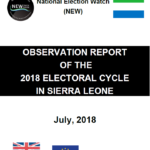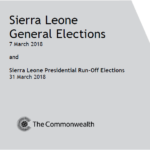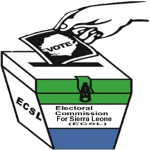General Provision
ELECTIONS OBSEDRVATIONS IN SIERRA LEONE
As a core value of ECSL, transparency in elections is an integral part of violence free and fair election.
Register To Be an Agent/ObserverDos & Don'ts of Observer/AgentElection Observation
These guidelines and code may be cited as the Guidelines and code of conduct for Observers.
Electoral observation has become an integral part of the democratic and electoral processes in Africa. In a bid to enhance the transparent, credible and accountable conduct of elections, and to assess the level of acceptability of the election results, there is the need to recognise the role of independent and competent local and international observers. These observers may assess the various stages of the electoral process from the registration of voters, nomination of candidates, polling, counting of ballots and announcement of results. The presence of competent observers is considered generally healthy in the context of assessing the level of acceptability of the election results.
Elections observation involves watching and noting what takes place in relation to an electoral activity, and thus making an informed judgment and report about the process on the basis of the information collected. In this context, election observation therefore means:-
“The purposeful gathering of information regarding an electoral process and the making of informed judgments about the process on the basis of the information collected.”
Note: Election observer has no role in actual administration of an electionDefinition
In these guidelines and code of conduct for observers, unless the context
Otherwise requires:
- a) “Organisation or Institution” means any registered body of persons or institution, either within or outside Sierra Leone, wishing to observe the electoral process and applying to the Electoral Commission (EC) for such, and accredited or granted observer status by the Commission.
- b) “Observer” means a person or group of persons representing an organization (whether local or international) accredited by the ELECTORAL COMMISSION FOR SIERRA LEONE for the purpose of observing any or all aspects of the electoral process (from the voter registration exercise, all the way through nomination period, campaigning, polling, counting and the announcement of the results).
- c) “The Commission” means the ELECTORAL COMMISSION FOR SIERRA LEONE (ECSL) of Sierra Leone.
- d) “Electoral process” means all electoral activities conducted by the Commission, including voter registration, exhibition of the provisional voters register (PVR), claims and objections to the provisional voters register, the nomination of candidates, polling, counting, and the compilation and announcement of results;
- e) “The PUBLIC ELECTIONS ACT” means the Public Elections Act of 2012.
- f) “Code of conduct” means the code of conduct for observers (both local and international) issued by ECSL.
Observation by accredited domestic and international organizations
1. The power to accredit observers, application for accreditation, revocation of accreditation and rights and obligations of observers in the electoral process is safeguarded in the Public Elections Acts 2012(Part xv) Sections 157, 158, 159, and 160.
- Domestic and international organizations may appoint persons to observe any or all aspects of the electoral process following their accreditation by the Commission. Such organisations shall hereinafter be collectively referred to as observer organisations.
- The following bodies shall have the right to apply for accreditation to observe any or all aspects of the electoral process:
- a) Domestic organisations, which have been accredited by the ELECTORAL COMMISSION FOR SIERRA LEONE.
- b) International and regional intergovernmental organisations;
- c) Representatives of states and foreign missions; and
- d) International non-governmental organisations permitted to exercise their activities in accordance with the laws effective in their home countries. The Commission shall, to the extent practical, extend all possible cooperation to observer organisations and their appointed observers and provide all non-confidential information in response to queries. However, the Commission shall not be under any obligation to provide support facilities or services beyond or other than those set out in the present guidelines and code of conduct.
- The provisions of these guidelines and code of conduct shall not apply to political parties, political party agents, or independent candidates or their agents.
- The person or persons authorized to represent an observer organization shall submit a written request for accreditation to the Commission, using the appropriate ECSL form. (ECSL/0B Form 01)
2. With respect to a domestic organization, the request for observer accreditation shall be accompanied by:
a, Copy of proof of being a registered organization;
b, Completed form requesting observation; i.e. ECSL/OB Form 01
c. Lists of observers (where appropriate) in ECSL/OB Form 02
3. With respect to an international organization, the request for observer accreditation shall be accompanied by
a) Copy of proof of registration in the country of origin or instrument establishing the organization; and
b) Completed ECSL form requesting observation. i.e. ECSL/OB Form 01
c) List of potential observers (where appropriate) in ECSL/OB Form 02
4. The observer organization shall also furnish such further information or documentation as may be required by the Commission.
5. Domestic organizations based in Freetown and international organizations shall submit the request for accreditation to the Department of Media and External Relations , at ECSL headquarters in Freetown.
6. Domestic organizations based outside Freetown may either submit the request for accreditation to the Department of Media and External Relations, Commission’s headquarters in Freetown or to the District Elections office in the district where the organization is based.
7. Forms to request accreditation shall be available from the Department of Media and External Relations at the headquarters of the Commission in Freetown or ECSL District Elections Offices and shall be free of charge.
8. As soon as practicable, the Commission shall inform the applicant organization(s) in writing that its application has been received.
Decisions Of Commission On Accreditations
1. If the Commission found that the application of a domestic or international organization for accreditation complies with the requirements set out herein, it shall accredit the applicant organization for the purpose of observing any or all aspects of the electoral process, and notify the applicant organization in writing within seven (7) days of receipt of a complete and accurate request for accreditation. The Commission shall also request the accredited organization to submit its list of appointed observers, if not already enclosed in the request form.
2. If the Commission found that the application of a domestic or international organization for accreditation does not comply with the requirements set out herein, it shall not accredit the organization and shall notify the applicant organization in writing of its decision and its reasons. Deficiencies in the application may be rectified by the applicant, without prejudice to the deadline of submitting requests for accreditation pursuant to sub- section 4(8) of these guidelines and code of conduct.
3. Decisions of the Commission with regard to applications are final.
4. The Commission shall issue a Certificate of Observer Accreditation to an applicant organization whose request for accreditation complies with the requirements set out herein.
Appointment Of Observers
1. A domestic or international organization which has been accredited by the Commission in accordance with these guidelines may appoint observers to observe any or all aspects of the electoral process. Observers appointed by accredited organizations shall be considered accredited by the Commission.
2. Copies of written notices to the appointed observers shall be submitted to the Commission by the accredited observer organization using the appropriate ECSL form i.e. ECSL/OB Form 02.
3. The accredited organization shall submit the completed ECSL form to the Commission’s headquarters or through the District Elections offices.
4. The forms giving notice of appointment of observers shall be available at the headquarters of the Commission in Freetown or any District Elections office.
5. Upon accreditation of an organization, the Commission shall issue ECSL observer identification cards or badges to the organization, on the basis of information submitted by the organization.
6. The observer identification cards or badges shall include the logo of the Commission and the signature of the authorized officials of the Commission.
7. The accredited organization shall issue the appointed observers with the observer identification cards or badges issued by the Commission.
The accredited organization shall also issue the code of conduct to the appointed observers.
- Every accredited observer is entitled to attend and observe at any time any or all aspects of the electoral process at the registration centers, exhibition centers, polling places and at other premises used by the Commission or its officials.
- Every accredited observer shall abide by the Public Elections Act of 2012, and code of conduct issued by the Commission.
- Every accredited observer shall be knowledgeable about the Public Elections Act 2012, regulations, electoral procedures, guidelines and code of conduct issued by the Commission.
- Observers shall be impartial and neutral while observing electoral activities. No observer shall interfere with electoral activities.
- No observer shall disrupt electoral activities.
- No observer shall make any remark aimed at influencing other persons on the premises where electoral activities are being conducted.
- Observers shall, while observing electoral activities, shall wear and visibly and conspicuously display their identification cards and any other documentation required by the Commission. If requested by ECSL official, the observer shall also produce a copy of the letter of his/her nomination by the organization or institution which he/ she is representing.
Revocation Of Accreditation
(1) The Commission may revoke the accreditation of an observer upon a determination that the individual has:
(a) Failed to comply with a lawful instruction, direction or order issued by or on behalf of the Commission;
(b) Hindered or obstructed any official of the Commission in the conduct of his or her duties; or
(c) Infringed the guidelines or Code of Conduct for observers
- An observer must comply with all national laws and regulations currently in force in Sierra Leone.
- An observer shall have the right to enter any registration centre, exhibition center, revision court, nomination centre, polling station and counting and collating centre throughout the country to observe any or all aspects of the electoral process.
- An organization or institution that wishes to be accredited as an observer shall forward an application to the Commission giving the following details:
a. the names, addresses and telephone numbers of the institution or organization and its head;
b. the names, addresses and telephone numbers of the officer(s) in charge of the observation exercise, if different from (a) above;
c, a list of all persons who will serve as observers together with their photographs;
d, the status of the organization or institution i.e. whether local or international;
e, an undertaking to abide by the relevant laws, rules, regulations, policies guidelines and code of conduct governing the election process;
- Accreditation of observer status shall be given only to institutions or organizations recognized by the Commission and not individuals.
- Unless the Registration / Revising/ Presiding Officer otherwise permits, access to the registration centre/nomination centre/polling station shall be limited to two (2) observers for each accredited institution or organization at any one time.
- Unless the Returning Officer otherwise permits, access to a counting center during the collation of results for the constituency or ward shall be limited to two (2) observers for each accredited institution or organization
- No observer shall be allowed access to any registration centre, nomination centre polling station or counting center
a. Unless he/she wears or displays the official identification issued by the Commission;
b, If he/she wears or in any manner displays any identification of a Political Party or a Candidate contesting the election;
8. The Commission or its representatives may cancel the accreditation of any institution, organization or individual where, in the opinion of the Commission or its representatives, the organization or individual has:
a, failed to comply with lawful instructions or directives issued by or on behalf of the Commission;
b, publicly demonstrates or favours a particular candidate or a political party;
c, hinders or obstructs any election official in the conduct of his or her lawful duties;
d, Infringes the guidelines and code of conduct for election observers published by the Commission;
9. An institution or organization sponsoring an Observer shall be responsible for all expenses incurred during the performance of his or her duties;
Organizations or Institutions accredited to participate in the electoral process shall conduct themselves properly, thereby paying attention to this Code of Conduct issued by the Commission.
- Observation of any/ all aspects of the election process is done with integrity,
- Transparency and impartiality; and in support of the conduct of a credible electoral process.
- Election Officials are left independent and impartial in doing their work; and
- Establish a level playing field for all actors in the electoral process.
Against this background, every observer representing an accredited organization, whether local or international shall adhere to this code of conduct.
- An observer shall not be involved in the administration of any aspect of the election process, either by giving directives to, or interfering with an election official in the performance of his/her election duties;
- An observer shall not touch or remove any registration/ election material or equipment without the consent of the Registration/Presiding officer at a registration centre/ polling station or the Returning officer as the case may be;
- An observer, institution/ organization shall maintain strict impartiality and neutrality in the process of observing any aspect of the election process, and shall not be seen displaying anything that could be interpreted as identification with a political party or candidate contesting an election;
- An observer shall not carry, wear or display on his or her person any electioneering material or any article, clothing or any insignia denoting support for or opposition to any political party or candidate contesting an election;
- An observer shall not carry or display arms or any offensive weapon during the conduct of his or her duties;
- An observer shall desist from reporting rumour as fact and shall substantiate allegations reported in connection with the conduct of any aspect of the election process. If an allegation cannot be substantiated, the observer’s report shall so state that he/she was unable to verify the allegation;
- Observer’s report dealing with irregularity or impropriety should be precise, clear, well documented stating time, location and the names of those involved where appropriate;
- An observer shall comply with lawful directives issued by or under the authority of the Commission, including an order to leave a registration centre/ polling station or any premises where an electoral activity is been conducted by the commission, given by the registration/ returning officer or presiding officer, as the case may be;
- An observer shall not accept or attempt to procure gifts, favour, and inducements from a political party or candidate, their agents, organizations or persons involved in the electoral process;
- An observer may report irregularities to an election official, but not to give instructions contrary to the decisions of an election official;
- An observer shall desist from making personal or premature comments, judgment about his or her observation to the media or other interested persons, and will limit remarks to general information about the nature of his or her activity;
- An accredited institution or organization must submit to the ELECTORAL COMMISSION FOR SIERRA LEONE (ECSL), a copy of its report on the aspect of the election process observed within 24hrs of its release, and must be prepared to discuss the report with the Commission if called upon;
- This Code of Conduct shall be binding upon all Organizations (and their representatives) accredited by the Commission for the purpose of observing any/all aspects of the entire election process organized by it.
2018 Election Observers
Election observation is the purposeful gathering of information regarding an electoral process and the making of informed judgments about the process on the basis of the information collected.



